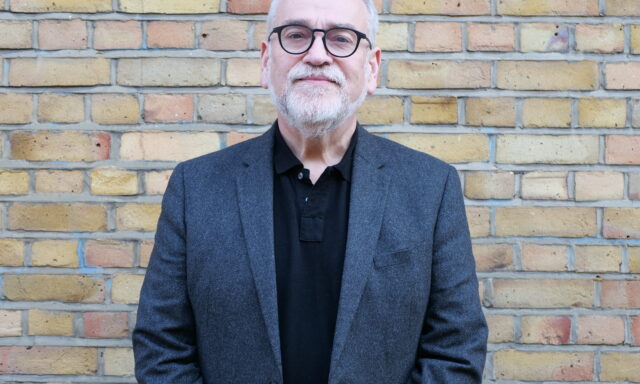Empower, don’t control: how Feroz Patel is reshaping finance at Midlands Partnership NHS Foundation Trust
10 November 2025

When Feroz Patel joined Midlands Partnership University NHS Foundation Trust seven months ago, he did not set out to tighten control. His first priority as chief finance officer has been to open doors, helping colleagues see finance not as a hurdle but as a tool for better decision making.
“I am all about accountability and autonomy,” he explained. “Here is your budget, and here is what we need to deliver. You decide how to do it.” It is an approach built on trust but underpinned by evidence. Patel wants every spend to be accompanied by data, analysis and clear outcomes, not to constrain innovation but to give it structure. “The best ideas come from those on the ground,” he added. “My role is to make sure they stand up to scrutiny and that we can show the value they create.”
Where finance was once “kept in a bubble”, Patel is working to make it part of everyday conversation, a shared language between clinicians, managers and corporate teams. The goal is not simply to balance the books but to help the Trust spend with intent, measure with confidence and invest in innovation that strengthens patient care.
From payment by results to mental health
Patel began his NHS career on the graduate training scheme in 2000. His early years at the Countess of Chester coincided with the introduction of Foundation Trusts and payment by results. Later he worked in commissioning, before moving to senior finance roles in Blackpool and Stockport, where he supported Greater Manchester’s devolution programme. He then became a recovery director in the Lancashire ICB, focused on bringing providers together around shared back-office and fragile clinical services.
The work was rewarding but distant from frontline impact. “You are not part of the decision-making process,” he commented. “Local politics and identity often overrule the logical option.” When the opportunity at MPFT came up, he decided to learn a new system and a new sector. “I wondered what mental health was like. I had never done it before.”
Prudence and innovation
Patel’s thinking is shaped by experience in acute settings where financial discipline and service improvement were inseparable. “Get the quality right and the money will look after itself,” he said. Years ago, he worked with a Chief Operating Officer who reviewed every long-stay patient each Monday. That simple discipline reduced lengths of stay. “Now we are firefighting so much that those conversations have been lost,” he revealed.
He rejects the idea that prudence and innovation are opposites. “In the organisations I have worked in, I have made sure they were together,” he explained. “Finance must be intrinsic to improvement.” At MPFT, his priority has been to rebuild financial literacy and confidence across the leadership team.
Recently he ran a session for the Trust’s top 100 leaders explaining why savings were needed. “The majority of leaders said they had never understood it,” he added. “They did not know what pay inflation costs or how much income we get.” Finance had been isolated, viewed as the department that said yes, or no. Patel’s approach is to involve people early, sharing information and asking for ideas. “You own your budget, and you own the plan to balance it,” he said.
The numbers that matter
In acute care, activity drives financial decisions. In mental health, Patel is learning which measures truly predict pressure. “I am tracking people,” he revealed. “Whole-time equivalent and pay spend make up 70 to 80 per cent of costs.” Two workforce issues dominate: sickness, running above five per cent, and injuries caused by patients. Both create staffing gaps and force services to operate reactively.
He wants to change that dynamic but says data access is a barrier. “It is not easy at all,” he admitted. “You have to build the mechanisms.” When an estates analysis showed utilisation at around 40 per cent, he asked why it had not been raised earlier. “They thought it would not get airtime. Now that the imperative is clear and leadership is engaged, people are coming forward with it.”
Investing with intent
Patel does not want every idea sent up the chain for approval. “Do not bring the decision to me,” he stated. “Here is your budget. Tell me how you will meet the pressure on pay inflation and deliver the same outcomes. The ideas must come from you.” His focus is to ensure there is a measurable return, whether that means savings, productivity or improved patient experience.
He is also rebuilding a clearer link between strategy and delivery. “There is currently no golden thread between our vision, our operational plan and team-level actions,” he said. A long period of growth through mergers and tenders took MPFT from a turnover of £100m to £700m, but not every bid made financial sense. “Sometimes we implemented services and developments for the benefit of patients without assessing the commissioning or funding mechanisms.” he added. We now have a much more commercial approach and ensure funding is available before committing to developments.
Managing risk and demand
Patel has quickly learned how different the risks are in mental health. The condition of the estate is one. “Ligature risks, door handles, hinges — all of that was new to me,” he explained. MPFT has £140m in cash but cannot access enough capital allocation to rebuild. “That is the biggest frustration.”
Focus on demand is another concern. “Unlike physical health waiting lists such as cancer or surgical treatment, autism and ADHD have a much more longer waiting time.” Staffing adds further complexity. “I want to invest in prevention,” he commented. “If we could spend ten million of existing budget differently, we might save thirty or forty million elsewhere in the system.”
Patel was also surprised by the reliance on private providers. “Here we do a tender every few weeks,” he said. “I had not realised how much capacity depends on the independent sector.” He links that directly to capital shortfalls. “If I spent thirty million building a new facility in Shropshire, it would pay for itself in a year,” he argued. “But mental health never gets the same level of capital as acute providers.”
Digital and data
On digital investment, Patel’s reasoning is simple: spend now to save later. MPFT uses AI to triage referrals and has some basic automation in corporate functions, but he believes there is much more to do. “By investing in digital, we could release ten million pounds of savings upstream.” A recent project costing four million is expected to remove 26 posts and save around a million pounds a year.
He knows the language around efficiency is sensitive. “We would never want to lose doctors and nurses,” he explained. “This is about protecting frontline services and freeing up capacity to help to reduce waiting times and the growth in demand.” He also sees collaboration between mental health trusts as the next step. “We should be working towards a single electronic patient record, but organisational sovereignty and competing priorities sometimes gets in the way.”
Style and outlook
Patel’s style is direct but inclusive. He adapts language to his audience, using data to ask questions rather than issue orders. “Why does it take one person an hour to treat a patient and another 45 minutes? Why does a patient wait five days after admission for a diagnostic?” he asked. “I call myself a disruptor, but it is about curios questioning, not conflict.”
Looking ahead, his measure of success is simple. “I want the finances to look after themselves. If we can reach a sustainable position, we can focus on innovation that improves patient care.”
He also wants mental health aligned more closely with acute, community and social care services as it is at MPFT. With patients, we need to consider the socio, economic, physical and mental health impact he said. “Unless you deal with the whole person, they will keep reappearing elsewhere in the system.”For Patel, the path forward begins with clarity, openness and persistence. “Find the data that matters. Make the aims explicit and keep asking the obvious questions until the answers change.”
This article is part of the Thalamos executive interview series, where we speak to Trust and ICB board members about the issues and challenges driving conversations today. Arun Chidambaram recently spoke on change, culture and the future of mental health care.


